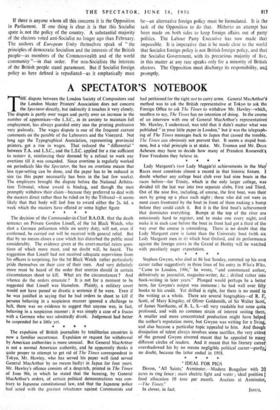The expulsion of British journalists by totalitarian countries is now
a familiar occurrence. Expulsion or request for withdrawal by American authorities is more unusual. But General MacArthur is not a normal American authority, and he apparently thinks it quite proper to attempt to get rid of The Times correspondent in Tokyo, "Mr. Hawley, who has served his paper well (and served General MacArthur by no means badly) in Japan for four years. Mr. Hawley's offence consists of a despatch, printed in The Times of June 9th, in which he stated that the banning, by General MacArthur's orders, of certain political demonstrations was con- trary to Japanese constitutional law, and that the Japanese police had acted with the greatest reluctance against Communists and had petitioned for the right not to carry arms. General MacArthur'4 method was to ask the British representative at Tokyo to ask the Foreign Office to ask The Times to withdraw Mr. Hawley—which, needless to say, The Times has no intention of doing. In the course
of an interview with one of General MacArthur's representativei Mr. Hawley, I understand, was told that it didn't matter what was published " in-your little paper in London," but it was the telegraph.4 ing of The Times messages back to Japan that caused the trouble. The Times can obviously not prevent that. It seems a stupid busi• ness, but a vital principle is at stake. Mr. Truman and Mr. Dean
Acheson may have to decide how many of President Roosevell'A Four Freedoms they believe in. * * * *




































 Previous page
Previous page